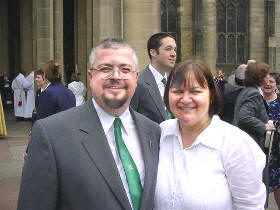Friday, May 6, 2005
THE HITCHHIKER’S GUIDE TO
THE GALAXY
By Andrew
Wooding
SHEFFIELD, UK (ANS) -- In
the late 1970s, relative unknown, Douglas Adams, was a scriptwriter and
script editor on the long-running TV series Doctor Who. In his spare
time, he wrote a six-part science fiction radio series called The
Hitchhiker’s Guide to the Galaxy which was broadcast with little
fanfare on BBC Radio 4 in the UK. No one expected it to be a hit, but
rapidly – through word of mouth – it became a cult, so much so that
Radio 4 repeated it almost immediately.
There then followed a Christmas special, a second radio series, a
six-part TV series, two stage plays, five multi-million selling novels,
a computer game, a comic book series, and more merchandise than you can
shake a towel at. The only aspect of the media that Hitchhiker’s hadn’t
conquered was the movies … till now. In fact, Douglas Adams died in
2001 in California while he was working on the script. A shame he
didn’t get to see the finished movie as I believe he would have loved
it, and the film stands as a fitting and lovingly-made tribute to his
life and work.
Martin Freeman (from UK comedy series The Office) makes an excellent,
perpetually-bewildered Arthur Dent. And Stephen Fry is just perfect as
the voice of the book. Alan Rickman raises a smile as depressed robot,
Marvin the Paranoid Android. Rapper Mos Def is surprisingly good as
Arthur’s alien friend Ford Prefect, although at times he reminded me of
Huggy Bear from Starsky and Hutch. And Sam Rockwell gives a manic,
high-energy performance as two-headed president of the universe, Zaphod
Beeblebrox.
As for the plot, well it has so many twists and turns (with countless
colourful characters) that it is almost impossible to summarise … so I
won’t even try. At the heart of the story, however, lies the quest to
find the ultimate answer to life, the universe and everything.
Eventually the answer is given, but it doesn’t make sense until the
ultimate question is found. Along the way, we meet the true creator of
the earth and see a new earth being made – mountains are painted the
right colour by workmen with paintbrushes, and hoses are used to fill
the oceans.
Have you ever asked the question: “Why am I here?” Have you ever
expected an answer? Douglas Adams was a well-known atheist and I
suspect that, along with millions of others in this post-modern age, he
would have said that trying to find an answer is impossible, and life
is just one big joke, an accident, with no meaning whatsoever. One of
the main themes of the story is that compared to the grand scheme of
things, mankind is just an insignificant, mind-bogglingly unimportant
blip. Depressing? You bet. There’s a word for this kind of thinking:
nihilism.
A similar word is existentialism. As I understand it, existentialism
also says that there is no ultimate meaning, but it adds that the best
thing to do therefore is create your own meaning. For some, this might
mean their career, children, relationships, whatever it might be. This
is reflected in the movie - in a controversial departure from previous
versions of Hitchhiker’s, there is a happy ending! I won’t say what it
is, but I will say that during the course of the film one of the
characters realises that he will never find the answer (or question) to
life, the universe and everything, but it doesn’t matter because he has
found something that has meaning for him: the love of someone.
Douglas Adams didn’t believe in God, but what about those who do? Are
we insignificant accidents who live for a short while and then die?
Jesus told us that God knows us through and through and believes we are
of great worth: “God even knows how many hairs are on your head. So
don’t be afraid. You are worth much more than many sparrows” (Matthew
10 v 30-31). And traditional Christian teaching says that God loves us
so much that he even allowed his Son (Jesus) to die so that we would
see how great his love for us is (see John 3 v 16).
I am a Christian, but I cannot pretend to know all the answers. In
fact, life still seems like a massive mystery sometimes. But I do know
that God knows me intimately and that I am loved. Sometimes that’s all
I know … and you know what? It’s enough. How about you?
Note: This is an abridged review of The Hitchhiker’s Guide to the
Galaxy, taken from Church Army’s word-on-the-web site. For Andrew
Wooding’s full review, along with some discussion questions, visit www.word-on-the-web.co.uk
and click on the link at the top for “Wooding Watches”. To receive a
free email Bible study, 365 days a year, clink on the “Signup” link and
follow the easy instructions.

Andrew Wooding, the older son of Dan and Norma Wooding,
is a Church Army evangelist currently working as Editor for
word-on-the-web. He is a lifelong fan of the movies, has been an active
member of the British Film Institute, and recently completed a course
on "Theology Through Film". He has written seven books for children and
teenagers, countless comic strips and magazine articles, and an ongoing
radio serial. He lives in Sheffield, is married to Alison, and they
have three children. He can be contacted by e-mail at andrewwooding@hotmail.com.
(Pictured:
Andrew and
Alison Wooding at Sheffield Cathedral).
ASSIST
News Service (ANS) - www.assistnews.net
-- E-mail: danjuma1@aol.com
|